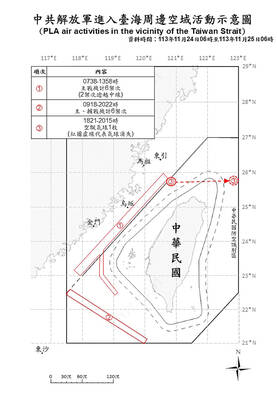Yang Hui-min’s (楊惠敏) action in delivering a national flag to Republic of China troops who were besieged by Japanese forces at a Shanghai warehouse in 1937 was driven by patriotism and bravery, the late heroine’s son said.
Yang, born in 1915, became a civilian heroine during the Second Sino-Japanese War from 1937 to 1945 when she braved grave danger to deliver the flag to about 400 besieged soldiers who were holding out at the Sihang Warehouse during the Battle of Shanghai.
Her heroism was later recorded for posterity and written into Taiwanese school textbooks.

Photo: CNA
In a recent interview with the Central News Agency as part of celebrations to mark the 70th anniversary of the end of the war, Yang’s second son, Chu Fu-hung (朱復轟), described his mother as a woman with extraordinary courage.
“Who would care about life or death when the country was going through such an ordeal?” Chu asked, citing his mother’s remarks while recalling her volunteering to make the delivery after learning that the soldiers wanted a national flag to declare their determination to guard their land.
Yang, who died in 1992, once said that seeing the warehouse surrounded by Japanese flags during the siege made her feel it would glorious to hoist a Republic of China flag above the warehouse.
Later, after the Republic of China’s defeat at the hands of the communists in China’s civil war, Yang followed the Chinese Nationalist Party (KMT) government to Taiwan, where she married National Taiwan University professor Chu Chung-ming (朱重明) and had two sons.
The Sihang Warehouse is on the Suzhou River, on the opposite bank to the Shanghai International Settlement, which existed as a congregation of foreign concessions from 1843 and 1943.
The Battle of Shanghai, which erupted on Aug. 13, 1937, disrupted Japan’s plan to seize China within three months.
About 400 Chinese soldiers held out at the Sihang Warehouse for four days and nights in October that year, allowing most of the other troops to retreat to the west and carry on the fight against the Japanese Imperial Army.

A decision to describe a Chinese Ministry of Foreign Affairs statement on Singapore’s Taiwan policy as “erroneous” was made because the city-state has its own “one China policy” and has not followed Beijing’s “one China principle,” Deputy Minister of Foreign Affairs Tien Chung-kwang (田中光) said yesterday. It has been a longstanding practice for the People’s Republic of China (PRC) to speak on other countries’ behalf concerning Taiwan, Tien said. The latest example was a statement issued by the PRC after a meeting between Singaporean Prime Minister Lawrence Wong (黃循財) and Chinese President Xi Jinping (習近平) on the sidelines of the APEC summit

Taiwan’s passport ranked 34th in the world, with access to 141 visa-free destinations, according to the latest update to the Henley Passport Index released today. The index put together by Henley & Partners ranks 199 passports globally based on the number of destinations holders can access without a visa out of 227, and is updated monthly. The 141 visa-free destinations for Taiwanese passport holders are a slight decrease from last year, when holders had access to 145 destinations. Botswana and Columbia are among the countries that have recently ended visa-free status for Taiwanese after “bowing to pressure from the Chinese government,” the Ministry

HEALTHCARE: Following a 2022 Constitutional Court ruling, Taiwanese traveling overseas for six months would no longer be able to suspend their insurance Measures allowing people to suspend National Health Insurance (NHI) services if they plan to leave the country for six months would be abolished starting Dec. 23, NHIA Director-General Shih Chung-liang (石崇良) said yesterday. The decision followed the Constitutional Court’s ruling in 2022 that the regulation was unconstitutional and that it would invalidate the regulation automatically unless the NHIA amended it to conform with the Constitution. The agency would amend the regulations to remove the articles and sections that allow the suspension of NHI services, and also introduce provisional clauses for those who suspended their NHI services before Dec. 23, Shih said. According to

‘GRAY ZONE’ TACTICS: China continues to build up its military capacity while regularly deploying jets and warships around Taiwan, with the latest balloon spotted on Sunday The US is drawing up contingency plans for military deployments in Japan and the Philippines in case of a Taiwan emergency, Japan’s Kyodo news agency reported. They would be incorporated in a first joint operation plan to be formulated in December, Kyodo reported late on Sunday, citing sources familiar with Japan-US relations. A US Marine Corps regiment that possesses High Mobility Artillery Rocket Systems — a light multiple rocket launcher — would be deployed along the Nansei Island chain stretching from Kyushu to Yonaguni near Taiwan, Kyodo said. According to US military guidelines for dispatching marines in small formations to several locations,